
|
![]()
Greatest Films of the 1990s
1990 | 1991 | 1992 | 1993 | 1994 | 1995 | 1996 | 1997 | 1998 | 1999
Title Screen Film Genre(s), Title, Year, (Country), Length, Director, Description 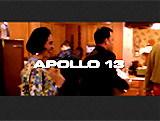


Apollo 13 (1995), 140 minutes, D: Ron Howard




Babe (1995, Australia/US), 91 minutes, D: Chris Noonan
A charming, delightful and intelligent fairy tale, a comic allegory, was based on a kid's book by British author Dick King-Smith, from first-time director Chris Noonan. It was followed by a darker, but respectable sequel, Babe: Pig in the City (1998). This Australian-made "sleeper" was a critical and financial success - a rare family film to earn an Academy Award Best Picture nomination (from a total of an amazing seven Oscar nominations), utilizing realistic, Oscar-winning computer effects (animatronics, puppets and CGI) to portray talking animals (including Fly the sheepdog, Ferdinand the duck (who thought he was a rooster to spare being eaten), the elderly ewe Maa, the trio of singing mice, and of course, the runty, orphaned piglet Babe). Despite being aimed at mostly young audiences, this film consistently remained intelligent but sometimes quite dark for a children's film. The tale was told in storybook fashion (with chapters introduced by a trio of singing mice) - about how young pink piglet Babe, raised by sheepdogs and daring to be different (and challenging his "proper place" in life), learned to herd sheep to avoid being killed for human food. One runty little piglet who appeared alone and sad was randomly selected - to be used for a Lion's Club guessing contest at the local fair. Good-hearted farmer Arthur Hoggett (James Cromwell) had the winning entry in the fair contest - accurately guessing the piglet's weight. He brought it to his farm - where the farm animals spoke to the disconsolate pig; he was given the name of Babe (Christine Cavanaugh). After a short period of adjustment, the narrator mentioned: "And so it was that the pig found his place in the world of the farm. And he was happy even in his dreams." The film's first indication that Babe was capable of something beyond his 'pig nature' was when he sensed that something was wrong on the farm - sheep rustlers were stealing Farmer Hoggett's sheep and loading them onto a truck. He ran back to the farm and alerted Hoggett to the problem. Babe's attempts at sheep-herding improved via coaching from elderly ewe Maa (Miriam Flynn) who suggested Babe treat the animals with politeness - and they behaved. Babe was further trained in sheep-herding, and one day provided Farmer Hoggett with a timely alert that three feral dogs were stealing some of his flock, resulting in the death of Maa from the marauding wild dogs. Farmer Hoggett first suspected Babe and aimed his double-barreled shotgun at the pig, but the Farmer abruptly changed his mind when he heard from his wife that other neighbors had also experienced problems with feral dogs. In fear, Babe ran away and was found the next morning in a cemetery by sheepdog Fly's mate Rex (Hugo Weaving). Farmer Hoggett brought Babe home and responded to Babe's demoralized state and refusal to eat after hearing that humans ate pigs - he fed Babe from a baby bottle. Knowing Babe's ability to herd sheep, Farmer Hoggett signed Babe up for trials in a sheepherding competition - the prestigious National Grand Challenge Sheepdog Championships. Babe was entered into the competition with the name "PIG." At first, Babe struggled to control the sheep, and Hoggett was soundly ridiculed for using a pig to herd sheep. Babe was saved when sheepdog Rex ran back to the farm to get a secret password "Baah Ram Ewe. To your breed, your fleece, your clan be true! Sheep be true!" (in exchange for promising to treat them better). Once the password was relayed to Babe, he was victorious in controlling the sheep to follow his commands, and received a perfect score of 100 from all the judges. In the rousing finale, amidst wild applause and cheers from the human audience in the grand-stands, the narrator described the tremendous accomplishment: ("And so it was, that in all the celebration, in all the hubbub of noise and excitement, there were two figures who stood silent and still, side by side...And though every single human in the stands or in the commentary boxes was at a complete loss for words, the man who in his life had uttered fewer words than any of them, knew exactly what to say") - the simple congratulatory words of kind-hearted, prideful owner Farmer Hoggett were: "That'll do, pig, that'll do." Babe looked up and sighed.

Before Sunrise (1995), 101 minutes, D: Richard Linklater



Braveheart (1995), 177 minutes, D: Mel Gibson


The Bridges of Madison County (1995), 135 minutes, D: Clint Eastwood


Casino (1995), 182 minutes, D: Martin Scorsese


Clueless (1995), 97 minutes, D: Amy Heckerling
Writer/director Amy Heckerling's teen-oriented, coming-of-age comedy reimagined Jane Austen's 1815 novel Emma set in the contemporary, elite 1990s environment of SoCal, specifically the wealthy, consumeristic suburb of Beverly Hills. The central character was self-centered, ultra-rich, blonde Valley-Girl, 15 year-old sophomore high-schooler Cherilyn "Cher" Horowitz (Alicia Silverstone) who spoke with distinctive lingo, including such slang expressions of the time as the PC-correct "hymenally-challenged" (instead of virgin), "as if," "what-ever," "surfing the crimson wave" (her menstrual period), "Baldwin" (meaning a very handsome male), "Betty" (Cher's term for the perfect girl), and "Monet" - ("It's like a painting, see? From far away, it's OK, but up close, it's a big old mess"). In order to boost her semester grade of C in debate class, Cher decided to find a way to make her nerdy debate teacher Mr. Wendell Hall (Wallace Shawn) "sublimely happy" so that he would raise her grade. She orchestrated match-making between him and Ms. Toby Geist (Twink Caplan) ("two lonely teachers") by writing a forged "Secret Admirer" love letter to Ms. Geist and other subterfuge to romantically bring them together. She also became acquainted with her own idealistic, college-aged ex-stepbrother Josh (Paul Rudd) who often visited to avoid his divorced mother and new stepfather. He was a socially-conscious, "do-good" environmentalist who was planning on going to school in the LA area. His non-materialistic values were completely contentious and opposite to Cher's. With her best friend Dionne Davenport (Stacey Dash), Cher (who was inspired "to do more good deeds") befriended grungy Tai Frasier (Brittany Murphy), a new (and "adorably clueless") transfer student. She attempted to give her a transformative makeover as her next "project." Unpredictably, Tai took a strong interest in often-tardy, long-haired slacker and skateboarder Travis Birkenstock (Breckin Meyer). Meanwhile, Cher began to swoon over a fashion-conscious new student named Christian Stovitz (Justin Walker), but Cher's pairing with him was doomed when it was revealed that Christian lacked sexual interest in Cher because he was gay. One of the film's funniest scenes was Cher's driving test with a DMV officer (Ron Orbach). After a falling-out with Tai, Cher began to think she had been wrong about everything: ("What did l do? I've created some sort of a monster"); she also realized that she was the "clueless" one: ("It all boiled down to one inevitable conclusion, I was just totally clueless"), and suddenly had an epiphany - she was jealous because of her own growing love for Josh, but now felt awkward around him. As the film concluded, Cher discovered an unexpected romance with Josh and accompanied him to the wedding of her two nerdy teachers Mr. Hall and Ms. Geist; after the ceremony, Cher was reconciled with her girlfriends Dionne and Tai, and was able to kiss Josh after triumphantly catching the flower bouquet.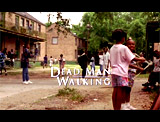


Dead Man Walking (1995), 120 minutes, D: Tim Robbins
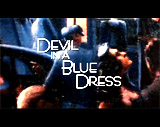


Devil in a Blue Dress (1995), 102 minutes, D: Carl Franklin
Writer/director Carl Franklin's suspenseful, neo-noir mystery thriller featured a hard-boiled, who-dun-it and find-the-dame 'detective' story. The picture conveyed the atmosphere of classic noirish intrigue in the late 1940s in a shadowy and segregated South-Central Los Angeles. The film's amateur 'detective' hero Ezekiel "Easy" Rawlins (Denzel Washington) - a lower-class, decorated WWII veteran from Houston, TX, was a victim of the end of the post-war boom. He found himself broke and jobless (and two months behind on his mortgage). He was easily persuaded and paid well by Dewitt Albright (Tom Sizemore) - an unscrupulous, thuggish white businessman (a 'fixer' with uncertain ties) to take on a seemingly-simple task. He was hired to locate the mysterious and slinky "devil in a blue dress" Daphne Monet (Jennifer Beals) who had been missing for two weeks. She was a tragic femme fatale figure and the fiancee-moll of powerful and popular mayoral candidate Todd Carter, who had dropped out of the race at about the same time she disappeared. It seemed that everyone wanted to locate her. Easy was hired because the missing 'white woman' was known to frequent the city's "Negro" honky-tonks and illegal jazz-juke joints. His convoluted search for the missing heroine brought him into a complex web and world of harsh local political rivalries in LA involving the mayoral race, corrupt and brutal LAPD cops and gangsters. Other troubling concerns included political corruption and scandal, racial conflict and prejudice, faked racial identity, double-dealing, murder (body count: 6), frame-ups, kidnapping, and extortion-blackmail (i.e., involving a misdelivered letter with pictures that could incriminate a pedophile). During his trouble-ridden search, Easy was implicated in two murders that he didn't commit. After locating and rescuing the kidnapped Daphne in the film's conclusion, that involved the killing of Albright and two thugs at his hideout-cabin in Malibu, she confessed to Easy that she had done everything behind the scenes to try and help her white lover Carter, but Carter's rival mayoral candidate Matthew Terell (Maury Chaykin) had threatened to go public about Daphne's mixed-racial heritage; however, she now felt that once Carter saw the incriminating photos of Terrell (proving he was a pedophile), their marriage would be assured, and Carter could re-enter the mayoral race and win. Daphne was hopeful that her relationship with Carter would now be restored. However, Carter promptly rejected Daphne; he then told Easy that he indeed loved Daphne, but that racial barriers were too high for any further relationship. Shortly later, Easy discovered that Daphne exiled herself and had left town, unable to belong in white society. The dejected Daphne had departed with her half-brother Frank Green (Joseph Latimore), a black gangster. As the film concluded, the California Eagle newspaper reported the headline: "CARTER BACK - A SHOE-IN FOR MAYOR - Quiet Civil Leader Returns as Flamboyant Terell Quits." In the final scene, Easy was considering his potential future plans as a PI with his religious-minded friend Deacon Odell (Albert Hall).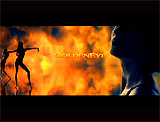


GoldenEye (1995), 130 minutes, D: Martin Campbell




Heat (1995), 172 minutes, D: Michael Mann



Kids (1995), 90 minutes, D: Larry Clark



Leaving Las Vegas (1995), 112 minutes, D: Mike Figgis


Losing Isaiah (1995), 111 minutes, D: Stephen Gyllenhaal
Along the lines of Kramer vs. Kramer (1979), this melodrama was about a vicious custody battle for a boy, and inter-racial adoption. Infant Isaiah was found abandoned in a garbage trash bin in an alley, deposited there by his African-American drug-addicted mother Khaila Richards (Halle Berry). Margaret Lewin (Jessica Lange), one of the white social workers at the medical hospital where Isaiah was treated, adopted the young boy into her family, including her husband Charles (David Strathairn) and sullen, pre-teen 11 year-old daughter Hannah (Daisy Eagan). The child, due to being a crack baby, had developmental issues, including hyperactivity, educational challenges, and emotional problems. However, three to four years later, once reformed birth mother Khaila had been released from prison (for shoplifting) and had freed herself from her cocaine-addiction through rehab, she wanted her son back. She was defended by zealous legal aid attorney Kadar Lewis (Samuel L. Jackson) on a pro bono basis. To defend themselves, the Lewins hired black lawyer Caroline Jones (La Tanya Richardson). The lengthy custody hearing-case, held in a Chicago courtroom with Judge Silbowitz (Jacqueline Brookes), was summarized in the tagline: "Who decides what makes a mother?" Mother Khaila testified that she was now qualified to mother Isaiah properly. Cross-examination revealed that she had been a prostitute, but had turned a new leaf - she had taken a job as a nanny and housekeeper for an affluent white couple. A social worker also claimed that Isaiah would be better served with a black parent, while another contradicted that claim, affirming that it would be detrimental if Isaiah left his adoptive parents to whom he was now tightly bonded. Kadar argued that "Black babies belong with black mothers." After further questioning, Margaret was forced to admit she hadn't introduced Isaiah to any black heritage, culture or black friends, and Charles admitted to a damaging secret of being unfaithful. The judge decided in favor of the simple-minded Khaila who didn't consider the consequences of the return of Isaiah. The transition was difficult for Isaiah, and he fought readjusting to a new parent. In the conclusion, Khaila contacted Margaret to have the child returned for the time being, for the best interests of the child.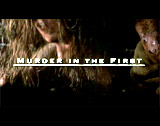


Murder in the First (1995), 122 minutes, D: Marc Rocco
This dramatic thriller, an indictment of the American penal system, its prisons and the miscarriage of justice, was very loosely based upon (or inspired by) the true case of an Alcatraz prisoner named Henri Young in the late 1930s and early 1940s. Orphaned and destitute teenaged Henri Young (Kevin Bacon) was unjustly imprisoned after stealing $5 from a hardware store/post office (this was the film's biggest fabrication - Young was actually a seasoned bank robber-criminal), and soon sent to San Francisco's infamous island, maximum-security prison Alcatraz. In 1938, Young and fellow inmate Rufus "Ray" McCain (David Michael Sterling) failed in an escape attempt (when fellow escapee Ray ratted), and Young was punished with solitary confinement in a rat-infested, icy dungeon for 3 years after being slashed with a straight razor by the sadistic and vicious associate prison warden Milton Glenn (Gary Oldman). Inhumanely treated and almost crazy, he received only a half an hour of daylight per year. Almost immediately after his release in 1941, Young stabbed and killed Rufus with an eating utensil in the neck. He was prosecuted for first-degree murder and destined for the gas chamber. He was defended by boyish-looking, idealistic, recent Harvard Law School grad James Stamphill (Christian Slater), a newbie public defender who had no experience in trial cases. Here's where the film's tagline began to make sense: "One was condemned. The other was determined. Two men whose friendship gave them the will to take on the system." Young was mostly incommunicative and catatonic at first with his crusading legal representative. Crusty and stern Judge Clawson (R. Lee Ermey) allowed Stamphill's ambitious attempt to put Alcatraz on trial for its inhumane treatment of prisoners. It was challenging to convince guards or prisoners to testify against the brutal conditions at Alcatraz. When Glenn was called to the stand, he couldn't explain why so many prisoners became mentally insane during his time as warden. Young took the stand and would not agree to plead guilty to the charges. He feared returning to Alcatraz and further punishment. The jury's verdict was 'involuntary manslaughter' (unintentional murder) - and they further called for a full investigation into Alcatraz. Warden Glenn was forbidden to work in the US penal system. When Young returned to Alcatraz, he was again placed in solitary confinement, and found dead about 7 months later in his cell.

Nixon (1995), 190 minutes, D: Oliver Stone




Pocahontas (1995), 81/84 minutes, D: Disney Studio


Safe (1995), 121 minutes, D: Todd Haynes
Julianne Moore's collaborations with director Todd Haynes started with her first feature-film lead role in his chilling, disturbing and provocative tale of a modern-day, environmentally-induced descent into madness. She effectively portrayed Carol White, a sexually-unfulfilled, affluent, zombie-like, routinely-bored San Fernando Valley housewife who became afflicted with a psycho-somatic, debilitating allergy. The film continually pondered the main ambiguous issue - was she psychologically impaired or physically ill, or both? To be toxic-free in a 'safe' personal oasis, the vulnerable, anxious, fragile and self-effacing Carol chose to protect herself by retreating from life and finding liberation in an expensive, New Age, residential treatment center in New Mexico. In the film's final image within her own sterile, egg-like, hermetically-sealed igloo 'home,' she addressed her mirror image: "I love you... I really love you...".


Sense and Sensibility (1995, UK/US), 135 minutes, D: Ang Lee




Se7en (1995), 127 minutes, D: David Fincher
In David Fincher's grisly crime thriller, clues at the various murder scenes for each of the Seven Deadly Sins (gluttony, greed, sloth, lust, pride, envy and wrath) were ingenuously displayed, but none of actual crimes were seen committed, except for the last one. Even before the opening title credits, the meticulous character of soon-to-retire, weary veteran Det. Lt. William Somerset (Morgan Freeman) was introduced after 32 years - he was going about his orderly and precise morning routine in his furnished bachelor apartment. The wise, perceptive and methodical homicide investigator was set in contrast to his headstrong replacement partner, young, arrogant, hotshot reckless rookie replacement Detective David Mills (Brad Pitt), in their pursuit of a diabolical and sociopathic serial killer named John Doe (unbilled Kevin Spacey) who had staged murders based on the 'seven deadly sins.' The film's best acted sequence was a diner scene between Somerset and Mills' unhappy relocated wife Tracy (Gwyneth Paltrow) who had just moved to the city from upstate. She confided in him about her unrevealed pregnancy - he advised her that the city was no place for a family, and that if she aborted, she shouldn't tell her husband that she was pregnant. If she went ahead with the delivery, however, he urged: "You spoil that kid every chance you get." In the unforgettable, nail-biting, concluding climax, maniacal killer John Doe led Detective Mills and Somerset to a remote desert area marked by power cable towers, promising to reveal the last two bodies and give his confession. Instead, he carried through with another sick and gruesome crime and souvenir - "her pretty head" (a severed head, never shown) delivered in a bloody cardboard box exactly at 7 pm by a driver who was paid $500. Doe confessed to the sin of Envy before killing Mills' pregnant wife Tracy earlier in the day: "I tried to play husband. I tried to taste the life of a simple man...It didn't work out so I took a souvenir - her pretty head." The last of the Seven Deadly Sins (wrath) was luridly demonstrated by anguished and angered Lt. Mills who vengefully shot Doe in the head, and then emptied his gun of five bullets into Doe's body, in exchange for his pregnant wife's beheading. After declaring that he wouldn't be quitting after all, Det. Somerset delivered the film's final words (in voice-over): "Ernest Hemingway once wrote, 'The world is a fine place and worth fighting for.' I agree with the second part."


Strange Days (1995), 145 minutes, D: Kathryn Bigelow



Toy Story (1995), 80 minutes, D: John Lasseter
Toy Story (1995) was the first feature length film to be completely animated by computers, by pioneering CGI animation studio Pixar Studios, which had already experimented with quite a few short subject films, most noticeably the Oscar-nominated short Luxo Jr. (1986) (whose characters became the basis for their logo) and Oscar-winning short Tin Toy (1988). The film's amazing computer effects were surpassed only by the intelligent, thoughtful script that had adult themes that both parents and their kids could relate to. Toy Story was a fantasy in which toys were animated, living beings when humans weren't around. Cowboy Woody (voice by Tom Hanks) was the highest ranked bedroom toy because he was the favorite of master Andy. (Woody's companions included Don Rickles as Mr. Potato Head, Wallace Shawn as Rex a meek dinosaur, Jim Varney as Slinky Dog, John Ratzenburger as Hamm the Pig, and Annie Potts as Woody's sweetheart Bo Peep). When Andy unwrapped a birthday present and a new hi-tech space and action-toy Buzz Lightyear (voice by Tim Allen) appeared, Woody feared that his top place had been usurped by the new rival. The deluded Buzz believed he was on a mission to save the planet, until the two become trapped in the house of Sid, a sadistic bully in the neighborhood, and they were forced to overcome their differences.






Twelve Monkeys (1995) (aka 12 Monkeys), 129 minutes, D: Terry Gilliam
Director Terry Gilliam's non-linear, very complex and plot-twisting, sci-fi fantasy thriller told about time travel, a dystopian future, subjective false memories and multiple realities, unusual efforts to thwart a devastating global plague, and futile attempts to change destiny. The film's time-travel paradox was clearly in play - a time-traveler couldn't go back in time and change the future, but could only observe it. The film's plot was definitely inspired by Chris Marker's French science-fiction featurette film La Jetée/The Pier (1962, Fr.)). In the existing, post-apocalyptic world of 2035, underground prison convict-inmate James "Jim" Cole (Bruce Willis) was selected or "volunteered" to venture out onto the Earth's surface, onto the streets of a devastated Philadelphia. Earth had now been virus-plagued for about four decades; a horrible virus had killed 5 billion people in 1996-1997 and forced humanity to live underground (the surface of the Earth was unliveable due to poisonous air). Cole spotted a snow covered graffiti-scrawled sign: "WE DID IT" stamped with the blood-red insignia of the "12 Monkeys," and he spotted a lion prowling on an upper building's ledge. [Note: The insignia of the group was a ring of red plastic monkeys.] To receive a pardon for his crimes, Cole was sent back in time from the future to observe key individuals who were suspected to be involved in causing a viral apocalypse. His mission was to obtain a pure sample of the unmutated virus in 1996 so that a cure might be found to prevent the future plague and ensure humanity's continued existence. Although he was supposed to initially time-travel to the year 1996, he found himself in the city of Baltimore in April of 1990 (pre-virus) (one of his many trips into the past and forward back to the present-future). After being questioned by psychiatrist Dr. Kathryn Railly (Madeleine Stowe), Cole was committed to the Baltimore County Hospital, where he met crazed, and hyperactive, manic inmate Jeffrey Goines (Brad Pitt). It was believed that Goines would lead a group known as the Army of the Twelve Monkeys, who were thought to be responsible for destroying humanity by unleashing a deadly virus. Spoiled rich kid Goines often spoke of his famous, wealthy and respected virologist father Dr. Leland Goines (Christopher Plummer) who ran a virology lab that was experimenting on deadly viruses. It was thought that Jeffrey had stolen a deadly virus from his father and unleashed it onto the world. However, it was later shown that Cole was the one who actually set everything in motion by proposing to Jeffrey the idea of destroying the human race that deserved to be wiped out. Throughout the film, Cole experienced a series of fragmented dream-memories of a wide-eyed young boy (Joseph Melito) witnessing a deadly shooting incident - the boy watched in awe as a gun-carrying long-haired man (wearing a tropical shirt and white pants) was gunned down in a long corridor by security police. The meaning of the recurring childhood memory was not understood even though it replayed itself often throughout the film - and its meaning was only revealed in the final moments of the film. Ultimately, Jeffrey Goines sold out the 12 Monkeys group, in exchange for being released from the institution by his father. Goines' activist crusade against animal cruelty was unrelated to the spread of the virus, and he was only guilty of releasing the wild animals from the Philadelphia Zoo. In a climactic airport sequence, Dr. Goines' sinister assistant Dr. Peters (David Morse) unleashed the virus into the Philadelphia area at a security checkpoint. Cole's efforts to stop Peters from boarding a plane led to his death. The paradox of the film was that the young boy watching the traumatic airport shooting and the long-haired, gunned down victim were the same person.


The Usual Suspects (1995), 105 minutes, D: Bryan Singer
Bryan Singer's convoluted, intriguing, darkly comedic film noir (his second feature film) was set mostly in a police interrogation room. The non-linear, puzzling film was sometimes a bit too self-consciously twisted, clever, and predictable, but still remained a great crime thriller. Slow-witted, chatty con-man Roger "Verbal" Kint (Kevin Spacey in a breakthrough, Oscar-winning role) had been offered immunity if he talked and provided testimony. He attempted to convince his captor, tough U.S. Customs Special Agent federal investigator Dave Kujan (Chazz Palminteri) about the enigmatic existence of Keyser Soze, a semi-mythical "devil," and almost supernatural Hungarian crime lord and mastermind. (Legend had it, according to Kint, that Keyser Soze was so willfully cold-blooded that when his family was threatened with rape and held hostage by Hungarian rivals, he killed his own family and then their captors and the rest of the mob - and "nobody's ever seen him since.") According to Kint (told in flashback), a group of tough and savvy criminals (the ones on all the film's posters, in an NYPD line-up hauled in after a Queens, NY truck hijacking), including crooked ex-cop Dean Keaton (Gabriel Byrne), explosives specialist Todd Hockney (Kevin Pollak), entry man and sniper Michael McManus (Stephen Baldwin), Latino Fred Fenster (Benicio Del Toro), and Kint himself, successfully pulled off a $3 million robbery of emeralds. As a result of the unwitting theft of some of Soze's valuable property, he had coerced the five thieves, who at first had been gathered together in the police line-up, to go on a compensatory suicidal mission to the San Pedro (CA) harbor to destroy a huge incoming drug supply of cocaine worth $91 million -- presumably an act of sabotage against Keyser's own Argentinian competitors in the drug trade. Verbal described how he and his gang had dealt with Soze only through his legal representative, Kobayashi (Pete Postlethwaite), who pressured them by threatening to kill Keaton's lawyer girlfriend Edie Finneran (Suzy Amis) and castrate McManus' young nephew if they didn't comply. The weaselly, limping, club-footed Kint, the only one of the five who survived the massacre and boat explosion at the harbor, confessed truths, half-truths, double-crosses, and lies. His recounting, aided by the contents of a bulletin board in the interrogation office, forced the viewer to deduce what was real and what was fictional in the stories he told, and who Soze really was. In the film's conclusion, Kint was released from the police station, and outside, his hand deformity and limp suddenly disappeared from his stride; the police sketch artist's rendering of Soze's face (that was received on a fax in the office, from hospitalized Arkosh Kovash's description - he was the only one who knew Keyser Soze's identity and could incriminate him) confirmed that Kint was Soze. To his stunned amazement, Detective Kujan scanned the office's bulletin board and noticed that some of the elements of Kint's preposterous swindler story (about Kobayashi-Keyser Soze) were improvised. Out on the street after leaving the station, the "cripple" Kint lit up a cigarette with his gold lighter, before he was picked up in a black car driven by Kobayashi, and whisked away.